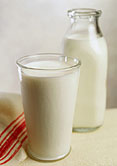- The Best Time of Day to Drink Bone Broth to Maximize Health Benefits
- 8 Ways to Increase Dopamine Naturally
- 7 Best Breads for Maintaining Stable Blood Sugar
- Gelatin vs. Collagen: Which is Best for Skin, Nails, and Joints?
- The Long-Term Effects of Daily Turmeric Supplements on Liver Health
- Could Your Grocery Store Meat Be Causing Recurring UTIs?
- Are You Making This Expensive Thermostat Error This Winter?
- Recognizing the Signs of Hypothyroidism
- 10 Strategies to Overcome Insomnia
- Could Artificial Sweeteners Be Aging the Brain Faster?
Drinking Milk May Slow Knee Arthritis in Women, Study Finds


Milk may be a useful weapon against arthritis of the knee for women, but the same can’t be said for yogurt or cheese, a new study says.
The more low-fat or fat-free milk women drank, the slower the progression of osteoarthritis of the knee, according to the study funded by the U.S. National Heart, Lung, and Blood Institute. Milk consumption did not show the same benefit for men, however.
Researchers led by Dr. Bing Lu of Brigham and Women’s Hospital in Boston also found that eating higher amounts of cheese had the opposite effect, speeding the progression of knee arthritis in women.
Taking in higher amounts of yogurt had no effect on knee arthritis in either women or men, the study found.
Osteoarthritis is the leading form of arthritis and affects nearly 27 million Americans aged 25 and older, the researchers noted, and knee arthritis tends to be more common and severe in women.
The study, published April 7 in Arthritis Care & Research, “is the largest study to investigate the impact of dairy intake in the progression of knee osteoarthritis,” Lu said in a journal news release. He believes that, based on these and other findings, “milk consumption plays an important role in bone health.”
The new study involved 1,260 women and almost 900 men with knee arthritis who provided information about their dietary habits. Their knees were assessed at the start of the study and again 12, 24, 36 and 48 months later.
While the study found an association between milk intake and knee health, it could not prove cause-and effect.
“Our findings indicate that women who frequently drink milk may reduce the progression of osteoarthritis. Further study of milk intake and delay in osteoarthritis progression are needed,” Lu concluded in the news release.
Two experts in nutrition believe milk may have a role to play in maintaining healthy knees.
“Certainly more research is needed, but it would be reasonable to encourage women with osteoarthritis to consider low-fat and fat-free milk as one more tool to combat the progression of [the disease],” said Christine Santori, a registered dietitian and program manager of the Center for Weight Management at Syosset Hospital in Syosset, N.Y.
Marlo Mittler is a nutritionist at Cohen Children’s Medical Center of New York, in New Hyde Park, N.Y. She said that “milk has long been known to play an important role in bone health. It contains the nutrients, such as phosphorus, calcium, protein and fortified with vitamin D, that are essential for daily life.”
According to Mittler, “the actual component of milk that allows it to play a preventive role in osteoarthritis progression still needs to be explored. It is also important to note that it is not whole milk but the low-fat and fat-free milk that shows to be effective in the delay.”
She said that estrogen’s role in bone health may help explain why milk intake seems to help ward off arthritis in the knees of women but not men. Calcium may also affect bone health in women in a different way than it does for men, she added.
According to Mittler, the high fat content of cheese may explain why that food actually sped knee arthritis progression.
Santori added that drinking milk is not the only route to healthier knees.
“There are steps you can take to reduce symptoms,” she said. “Most importantly, maintain a healthy weight not only to reduce pressure on the joints but also to reduce the inflammatory action of fat tissue. Consuming vitamin C for cartilage production as well as omega 3 fatty acids, antioxidants, and other anti-inflammatory agents may also be beneficial.”
More information
The U.S. National Institute of Arthritis and Musculoskeletal and Skin Diseases has more about osteoarthritis.
Source: HealthDay
Copyright © 2026 HealthDay. All rights reserved.










